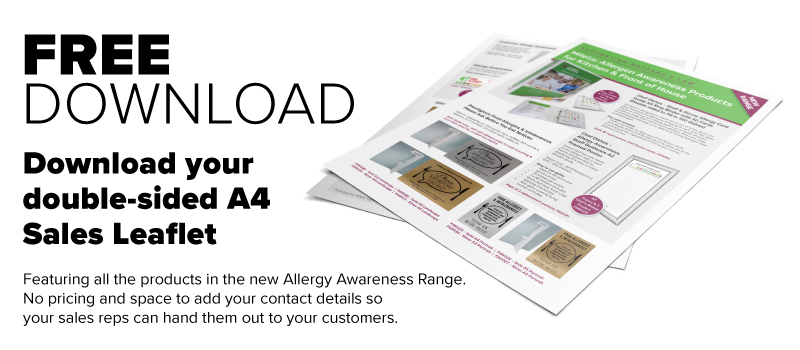Natasha’s Law; Allergy Awareness
Natasha’s Law; Get Ready for the Change in Allergy Regulations in October
The UK Food Information Amendment, also known as Natasha’s Law, comes into effect from 1st October 2021 and will require food businesses to provide full ingredient lists and allergen labelling on foods prepackaged for direct sale on the premises. The legislation is being introduced to protect allergy sufferers and give them confidence in the food they buy.
These changes will apply to businesses in England, Scotland, Wales and Northern Ireland. It is estimated that almost 1 in 5 people in the UK suffer from an allergy. This amendment was brought about thanks to the actions of a lobbying group lead by the parents of Natasha Ednan-Laperouse, the teenager who died after suffering an allergic reaction to an undeclared ingredient in a prepacked meal. Due to their efforts, the government confirmed that stronger laws would be implemented to protect those with food allergies and give them greater confidence in the food they buy.
According to the new rules, PPDS (Prepacked for Direct Sale) food will have to clearly display the following information on the packaging:
- Name of the food.
- Full ingredients list, with allergenic ingredients emphasised (for example in bold, italics or a different colour).
Although Natasha’s Law covers PPDS, food businesses that serve freshly prepared, ready to eat food in cafes, pubs, restaurants, hotels etc. can take positive steps to help ensure allergy sufferers also have confidence in the food they buy when dining out.
Food business operators in the retail and catering sector are required to provide allergen information and follow labelling rules as set out in food law.
This means that food business operators must:
- provide allergen information to the consumer for both prepacked and non-prepacked food and drink
- handle and manage food allergens effectively in food preparation.
14 Allergens
Food businesses need to tell customers if any food they provide contain any of the listed allergens as an ingredient. Consumers may be allergic or have intolerance to other ingredients, but only the 14 allergens are required to be declared as allergens by food law.
The 14 allergens are: celery, cereals containing gluten (such as barley and oats), crustaceans (such as prawns, crabs and lobsters), eggs, fish, lupin, milk, molluscs (such as mussels and oysters), mustard, peanuts, sesame, soybeans, sulphur dioxide and sulphites (if they are at a concentration of more than ten parts per million) and tree nuts (such as almonds, hazelnuts, walnuts, brazil nuts, cashews, pecans, pistachios and macadamia nuts).
This also applies to additives, processing aids and any other substances which are present in the final product.
Allergen information for different types of food businesses
How you provide allergen information to customers will depend on the type of food business.
Food businesses
You must provide allergen information in writing if you sell or provide food to your customers directly. This could be either:
- full allergen information on a menu, chalkboard or in an information pack
- a written notice placed in a clearly visible position explaining how your customers can obtain this information
When allergen information is provided as part of a conversation with a customer, this can be backed up by written information. This would ensure that it is accurate and consistent. You can display this allergy and intolerance sign to tell customers how they can find allergy information, or create your own.
Buffets
If you offer food in the form of a buffet, you need to provide allergen information for each food item separately. You should not provide it for the buffet as a whole. You can provide this information by labelling the allergens contained in individual dishes, or by displaying a sign directing customers to ask staff for allergen information. This information must be visible, clearly legible and easily accessible to the customer.
Food delivery and takeaway food
If food is sold online or by phone through distance selling, allergen information must be provided at two stages in the order process.
You must provide allergen information:
- before the purchase of the food is completed – this can be in writing (on a website, catalogue or menu) or orally (by phone)
- when the food is delivered – this can be in writing (allergen stickers on food or an enclosed copy of a menu) or orally (by phone).
Allergen information should be available to a customer in written form at a point between a customer placing the order and taking delivery of it. Takeaway meals should be labelled clearly so customers know which dishes are suitable for those with an allergy.
Mileta has a brand new range of Allergen Awareness products for both kitchen and front of house to help ensure that staff are aware of potential allergens in the food they are serving, as well as products to encourage customers to ‘Ask Before They Eat’ if they suffer from any food allergies or intolerances.
Source: Natasha’s Law & Food Standards Agency






